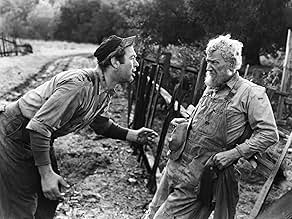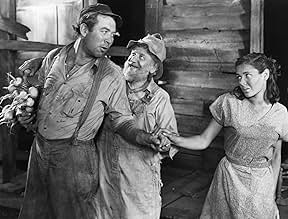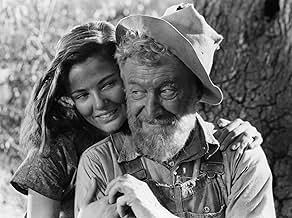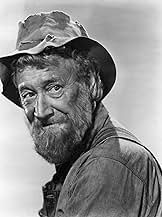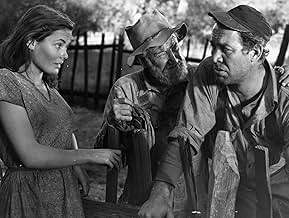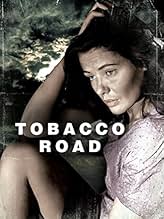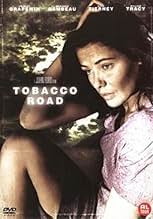IMDb RATING
6.4/10
2.7K
YOUR RATING
Hillbilly family farm life in 1941 rural Georgia.Hillbilly family farm life in 1941 rural Georgia.Hillbilly family farm life in 1941 rural Georgia.
- Director
- Writers
- Stars
- Awards
- 2 wins total
Dorothy Adams
- Payne's Secretary
- (uncredited)
- Director
- Writers
- All cast & crew
- Production, box office & more at IMDbPro
Featured reviews
Dirt poor, elderly Georgia farmer Jeeter Lester (Charley Grapewin) schemes to get some money so that he and his wife Ada (Elizabeth Patterson) can remain at their dilapidated frame house on Tobacco Road, in this Great Depression era story, part comedy, part drama.
As country hicks, most of the characters are rather too stereotyped to be realistic. The film's script is very talky, not surprising since the story originated as a stage play. The film's plot varies wildly from slapstick comedy to morose drama. And therein lies the main problem.
Rural poverty in the South during the 1930s was no laughing matter. It was an intensely painful and prolonged episode of human misery. I can understand how viewers in those days needed some comic relief, but not in a story about poverty. The hyper-antics of young Dude, the film's comic relief, are extremely annoying. Those scenes dilute the seriousness of the film's underlying theme. And the subplot wherein Dude and Sister Bessie go off together seems like plot filler.
Charley Grapewin gives a fine performance in the lead role. But Marjorie Rambeau as Sister Bessie, and William Tracy as Dude overact. Part of this overacting could have been the result of poor film direction.
The film's background music runs the gamut from frivolous and nondescript in the comedic scenes to old-time gospel songs like "Shall We Gather At The River" during more serious moments.
Given the era in which the film was made, "Tobacco Road" is okay, if you give it some slack. But the story would have been better without the slapstick comedy. In any event, it's a good movie to watch when you're depressed and think things can't get much worse.
As country hicks, most of the characters are rather too stereotyped to be realistic. The film's script is very talky, not surprising since the story originated as a stage play. The film's plot varies wildly from slapstick comedy to morose drama. And therein lies the main problem.
Rural poverty in the South during the 1930s was no laughing matter. It was an intensely painful and prolonged episode of human misery. I can understand how viewers in those days needed some comic relief, but not in a story about poverty. The hyper-antics of young Dude, the film's comic relief, are extremely annoying. Those scenes dilute the seriousness of the film's underlying theme. And the subplot wherein Dude and Sister Bessie go off together seems like plot filler.
Charley Grapewin gives a fine performance in the lead role. But Marjorie Rambeau as Sister Bessie, and William Tracy as Dude overact. Part of this overacting could have been the result of poor film direction.
The film's background music runs the gamut from frivolous and nondescript in the comedic scenes to old-time gospel songs like "Shall We Gather At The River" during more serious moments.
Given the era in which the film was made, "Tobacco Road" is okay, if you give it some slack. But the story would have been better without the slapstick comedy. In any event, it's a good movie to watch when you're depressed and think things can't get much worse.
John Ford directed this adaptation of a hit play about a family of dirt poor toothless Southern farmers. Charley Grapewin is great and carries the film on his shoulders. Elizabeth Patterson gives an enjoyable (and sometimes sensitive) turn as his wife. William Tracy plays a savage character who grates on the nerves but he does a good job at it. Ward Bond is funny as a neighbor married to one of their daughters. He has the movie's most crowd-pleasing scene when he puts Tracy in his place. Dana Andrews and Gene Tierney have small roles. I think Tierney spoke less than twenty words the whole film.
Any comparison between this film and Ford's classic from the year before, Grapes of Wrath, is absurd. Beyond the very superficial similarities, they are nothing alike. This doesn't have the gravitas or artistry of that film. The closest it comes is the scene when Grapewin and Patterson talk about two of their children who left home and never returned. The rest is a grotesque comedy about people that are almost cartoon characters more than humans.
Obviously not for the easily offended among us. This film peddles in just about every Southern stereotype you can think of. Having grown up in the South with relatives not too far removed from the types of characters displayed in this, I'm not really bothered by it. Stereotypes generally have some basis in truth, no matter how much we don't want to admit it. Amusing at times, moving once or twice, but not the masterpiece it wants to be. See it for Grapewin's energetic performance if nothing else.
Any comparison between this film and Ford's classic from the year before, Grapes of Wrath, is absurd. Beyond the very superficial similarities, they are nothing alike. This doesn't have the gravitas or artistry of that film. The closest it comes is the scene when Grapewin and Patterson talk about two of their children who left home and never returned. The rest is a grotesque comedy about people that are almost cartoon characters more than humans.
Obviously not for the easily offended among us. This film peddles in just about every Southern stereotype you can think of. Having grown up in the South with relatives not too far removed from the types of characters displayed in this, I'm not really bothered by it. Stereotypes generally have some basis in truth, no matter how much we don't want to admit it. Amusing at times, moving once or twice, but not the masterpiece it wants to be. See it for Grapewin's energetic performance if nothing else.
Director John Ford was certainly an odd duck; the stories he was attracted to ran the gamut from "The Searchers" to "The Quiet Man" to this one, a head-scratcher of a tragicomedy based on Erskine Caldwell's book and Jack Kirkland's popular stage-adaptation. Eccentric Georgia farm family is threatened with poverty when the bank forecloses on their land, leading patriarch Jeeter to use his wiles in hopes of raising $100 for a year's worth of rent. Movie swings wildly from hick-slapstick to poignant drama; however, once you've had a chance to get attuned to Ford's rhythm, it's a pretty terrific ride. Charley Grapewin gives an Oscar-caliber performance (he wasn't even nominated!), and it's fun to see Gene Tierney and Dana Andrews looking very youthful three years before "Laura". Good show! *** from ****
Tobacco Road (1941)
** 1/2 (out of 4)
I take pride in watching bizarre movies from every country and every decade but I never figured that's what I'd be viewing when I sat down to watch this John Ford film that seems to have been forgotten over the years. The movie, based on the famous novel and long-running play, centers on Jeeter Lester (Charley Grapewin) and his family, poor Georgia farmers who are about to get kicked off their land unless they can round up $100 to stay for a year. That's pretty much all there is to know story wise, although the screenplay does take the film into different directions as the family is faced with the possibility of losing everything they love. If people got wide-eyed about the way Ford showed Indians then they're probably going to have their heads rolling off at this look at a redneck family. I was really, really caught off guard by how incredibly bizarre and strange this movie was. I think part of this is due to the comedy never working and for some strange reason this gives the film a rather bizarre atmosphere because you're watching this strange stuff yet nothing really laughing. The humor is rather strange because there's an older man (ward Bond) not wanting to marry an "old woman" of 23-years because he likes his 13-year-old current wife. We have humor about one of the Lester sons (William Tracy) who is so crazy and out of control that you can't help but think he's retarded and the film tries to get laughs off of this. We have the young Lester daughter (Gene Tierney) lusting after the older man with a lot of sexual innuendo. This redneck family is just so weird that you can't help but be slightly put off by them and the fact that the film is trying for laughs just makes some of it even stranger. The one major saving grace is the performance by Grapewin who really is marvelous here. His old-time redneck is spot on with the dialogue delivery and body movements that there's no doubt the character will ever leave your mind once you've seen it. Supporting players like Elizabeth Patterson and Dana Andrews come off pretty well but the same can't be said for Tierney who really looks bad here. She just isn't right for the role and she comes off looking like she's really struggling to do something with it. Ford's direction isn't all that bad but there's a reason this film isn't really that well-known or talked about when people discuss his work.
** 1/2 (out of 4)
I take pride in watching bizarre movies from every country and every decade but I never figured that's what I'd be viewing when I sat down to watch this John Ford film that seems to have been forgotten over the years. The movie, based on the famous novel and long-running play, centers on Jeeter Lester (Charley Grapewin) and his family, poor Georgia farmers who are about to get kicked off their land unless they can round up $100 to stay for a year. That's pretty much all there is to know story wise, although the screenplay does take the film into different directions as the family is faced with the possibility of losing everything they love. If people got wide-eyed about the way Ford showed Indians then they're probably going to have their heads rolling off at this look at a redneck family. I was really, really caught off guard by how incredibly bizarre and strange this movie was. I think part of this is due to the comedy never working and for some strange reason this gives the film a rather bizarre atmosphere because you're watching this strange stuff yet nothing really laughing. The humor is rather strange because there's an older man (ward Bond) not wanting to marry an "old woman" of 23-years because he likes his 13-year-old current wife. We have humor about one of the Lester sons (William Tracy) who is so crazy and out of control that you can't help but think he's retarded and the film tries to get laughs off of this. We have the young Lester daughter (Gene Tierney) lusting after the older man with a lot of sexual innuendo. This redneck family is just so weird that you can't help but be slightly put off by them and the fact that the film is trying for laughs just makes some of it even stranger. The one major saving grace is the performance by Grapewin who really is marvelous here. His old-time redneck is spot on with the dialogue delivery and body movements that there's no doubt the character will ever leave your mind once you've seen it. Supporting players like Elizabeth Patterson and Dana Andrews come off pretty well but the same can't be said for Tierney who really looks bad here. She just isn't right for the role and she comes off looking like she's really struggling to do something with it. Ford's direction isn't all that bad but there's a reason this film isn't really that well-known or talked about when people discuss his work.
When John Ford filmed "Tobacco Road" in 1941 the play was still running on Broadway. It opened in 1933 and even today only "Life with Father" has had a longer run for a non-musical production. It was based on Erskine Caldwell's risque novel about dirt-poor Southern farmers and after his success with "The Grapes of Wrath" Ford might have seemed like a fairly obvious choice for the film version but Caldwell was not Steinbeck and this was no "Grapes of Wrath".
It's tolerable enough but Charley Grapewin's old codger Jeeter, a supporting character now given centre screen, gets on your nerves very quickly. In fact, everyone in this picture gets on your nerves very quickly, (they are all portrayed as greedy imbeciles). William Tracy is terrible as the son and a youthful Gene Tierney, (it was only her second film), is totally miscast as sex-pot Ellie May. If Marjorie Rambeau is a little less grating as Sister Bessie it's perhaps because she, at least, is trying to underplay her part and only the great Elizabeth Patterson comes out of this with any dignity. In other words, it's certainly nobody's finest hour, (except perhaps cinematographer Arthur Miller), and Ford's least of all. The only real surprise about it is how it was ever a hit in the first place.
It's tolerable enough but Charley Grapewin's old codger Jeeter, a supporting character now given centre screen, gets on your nerves very quickly. In fact, everyone in this picture gets on your nerves very quickly, (they are all portrayed as greedy imbeciles). William Tracy is terrible as the son and a youthful Gene Tierney, (it was only her second film), is totally miscast as sex-pot Ellie May. If Marjorie Rambeau is a little less grating as Sister Bessie it's perhaps because she, at least, is trying to underplay her part and only the great Elizabeth Patterson comes out of this with any dignity. In other words, it's certainly nobody's finest hour, (except perhaps cinematographer Arthur Miller), and Ford's least of all. The only real surprise about it is how it was ever a hit in the first place.
Did you know
- TriviaWalter Brennan turned down the lead role because he disapproved of the character's laziness.
- GoofsWhen the new car is tipped over, after being driven on dirt roads and through mud, the underside is spotless.
- Crazy creditsOpening and some of the closing credits are presented written in real sand.
- ConnectionsReferenced in The Lady Is Willing (1942)
- SoundtracksDixie's Land
(uncredited)
Written by Daniel Decatur Emmett
[Variations often played as background music]
- How long is Tobacco Road?Powered by Alexa
Details
- Release date
- Country of origin
- Language
- Also known as
- Duvanski put
- Filming locations
- Encino, Los Angeles, California, USA(poor farm sequence)
- Production company
- See more company credits at IMDbPro
Box office
- Gross worldwide
- $534
- Runtime1 hour 24 minutes
- Color
- Aspect ratio
- 1.37 : 1
Contribute to this page
Suggest an edit or add missing content


